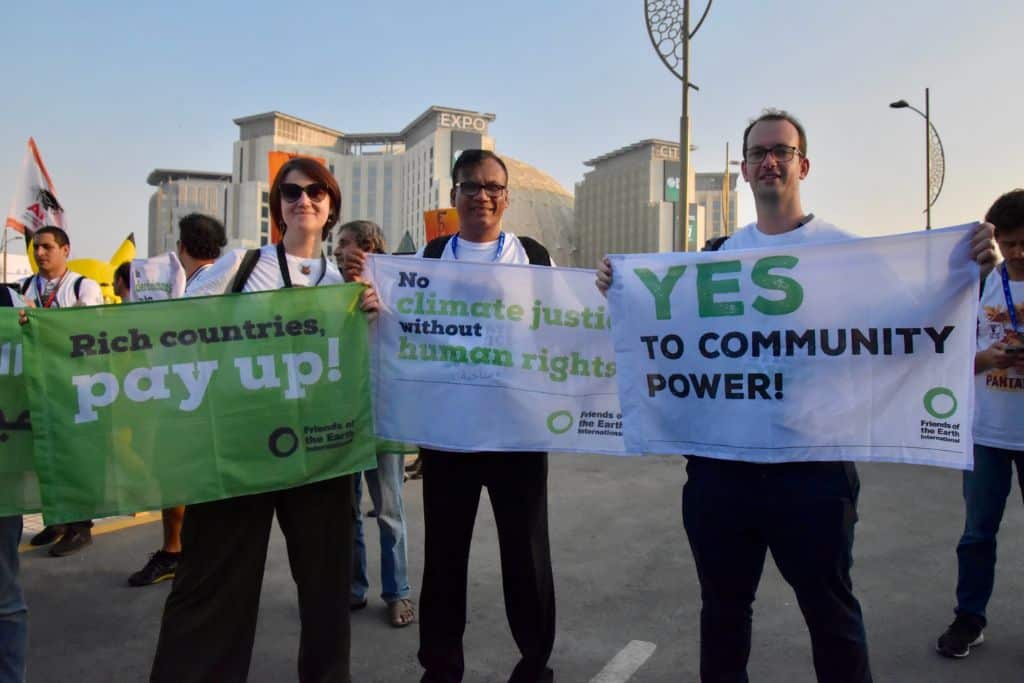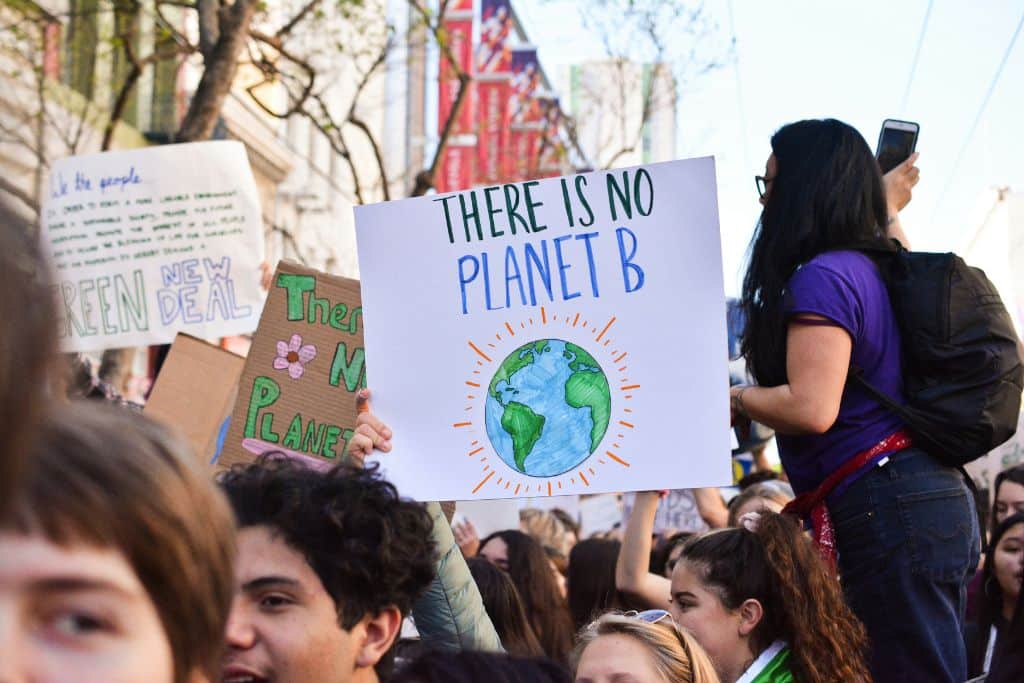The intensifying climate crisis is marked by a rise in severe weather events and economic insecurity for many. In 2024, climate litigation continues to emerge as a crucial strategy in tackling the ongoing crisis as more individuals, environmental groups, and communities seek legal avenues to hold governments and corporations accountable for their contributions to climate change. Here are some of this year’s most important climate lawsuits.
—
Climate ambition worldwide remains insufficient to address the climate crisis, leading to a surge in legal actions by individuals, groups, and governments seeking to enforce existing climate laws, integrate climate action into environmental laws, demand more ambitious climate policies, and establish clear human rights obligations affected by climate change.
As we have witnessed in the Global Climate Litigation Report 2023, this year will also see a significant escalation in the battle against climate change, with a predicted global surge in environmental lawsuits.
Governments and major corporations, known for their substantial environmental footprints, are likely to face legal challenges as their commercial activities often conflict with existing green legislation, whether at the state or global level. This is particularly relevant as more countries worldwide are pushing for comprehensive strategies to achieve net-zero emissions and a fossil fuel phaseout in the near future.
Let us delve into some of the significant climate litigation cases unfolding this year.
You might also like: Elections 2024: How Much Do Voters Care About Climate?
10 Global Climate Lawsuits to Follow this Year
1. Friends of the Earth’s legal battles
The climate advocacy organization Friends of the Earth has been at the forefront of legal actions against Royal Dutch Shell and ING Bank. This year, a Dutch court is scheduled to review an appeal by the Dutch arm of Friends of the Earth regarding a landmark ruling against oil giant Shell. This ruling marked the first instance where a private corporation was mandated to reduce its greenhouse gas emissions.
Additionally, the organization has initiated a climate lawsuit against Amsterdam-based global bank ING. The lawsuit demands that ING cease “contributing to dangerous climate change in the future” by discontinuing loans to fossil fuel customers who continue to expand oil, gas, and coal activities without a robust phase-out plan. ING has already responded by acknowledging the urgency of limiting global warming to 1.5C and the necessity of transitioning to a low-carbon economy. ING reaffirms its commitment to sustainability and expresses its willingness to engage in constructive dialogue or court proceedings if necessary.

2. Chicago’s climate litigation
Chicago is taking a bold step by suing five major oil and gas companies, including BP, Chevron, ConocoPhillips, Exxon Mobil, and Shell, as well as the American Petroleum Institute, for their alleged role in contributing to climate change and its destructive impacts on the city. The lawsuit alleges that these companies have misled the public about the dangers of climate change and have actively worked to undermine scientific evidence.
Chicago seeks to hold these companies accountable for the costs associated with climate change, including damage to property and infrastructure and is spending significant resources on climate projects in low-income communities. The case has been met with criticism from the American Petroleum Institute, which argues that climate policy should be determined by Congress rather than the courts.
3. Portuguese children’s climate case
Initiated in September 2020 by four Portuguese children and two young adults against 32 European governments, this case alleges human rights violations – right to life, right to privacy, right not to experience discrimination – as a consequence of the government’s inadequate action to address the climate crisis. The lawsuit represents the largest climate case ever to be brought before the European Court of Human Rights (ECHR) in Strasbourg.
Centrally, the allegations address the expectations of children and youth and the rights of future generations to an environment that is not destroyed by climate change. If successful, the complaint could prompt the European Court, as well as national courts to demand faster carbon dioxide emission reductions from governments. A ruling in the case is expected in the first half of 2024.
More on the topic: Portugal’s Gen-Z Sues 32 Governments in Largest Climate Trial to Be Heard by Europe’s Top Human Rights Court
4. Pacific coast tribes litigate big oil for climate deception
The Makah and Shoalwater Bay Tribes, two federally recognized sovereign Native Nations in Washington state, are suing major oil and gas companies for their role in causing disastrous changes to the climate. The tribes argue that these changes have forced their communities to relocate to higher ground, resulting in millions of dollars in losses.
They are seeking to hold ExxonMobil, Shell, Chevron, BP, ConocoPhillips, and Phillips 66 accountable for their deceptive conduct, including misleading marketing campaigns about the dangers of fossil fuels. If successful, the lawsuits would force the companies to pay for the damage caused by their actions. This case could signal a new avenue for tribal governments to recover climate costs from polluters.
5. California youth sue EPA over climate change
Our Children’s Trust, representing 18 California children, is taking legal action against the US Environmental Protection Agency (EPA). The lawsuit alleges that the EPA violated the children’s constitutional rights by failing to protect them from the effects of climate change. The lead plaintiff, “Genesis B.,” a 17-year-old Long Beach resident, is unable to stay cool in her home during the day due to extreme heat days, which impacts her ability to focus on schoolwork.
Other plaintiffs, aged eight to 17, have experienced wildfires and flooding, forcing them to evacuate or cancel activities. The lawsuit claims the EPA’s inaction on carbon dioxide emissions from fossil fuels violates the children’s constitutional rights and seeks declarations about the environmental rights of children and the EPA’s responsibility to protect them.
6. California charges oil and gas companies for climate change misinformation
Joined by California Governor Gavin Newsom, State Attorney General Rob Bonta has filed a lawsuit against five major oil and gas companies ExxonMobil et al. and the American Petroleum Institute for misleading the public about climate change, marking a significant legal challenge against the fossil fuel industry.

The lawsuit alleges that these companies have known since at least the 1960s that the burning of fossil fuels would warm the planet and change the climate, yet they have denied or downplayed these facts in their public statements and marketing. It seeks to hold these companies accountable for the damages caused by climate change in California and to prevent further false or misleading statements about the contribution of fossil fuel combustion to climate change.
You might also like: Leading the Way: California’s Trailblazing Efforts to Fight Climate Change
7. Elderly Swiss women challenge government over climate inaction
In 2024, an important ruling is anticipated from the case of older Swiss women who argue before the European Court of Human Rights that their government’s failure to reduce greenhouse gas emissions has violated their human rights. The women, all over 63, contend that more frequent and intense heatwaves – a result of climate change – are infringing on their rights to life and health. According to the group KlimaSeniorinnen (Senior Women for Climate Protection), the Swiss government is responsible for this harm due to its contribution to climate change and weak domestic emissions reduction policies.
The case, the first in the European Court of Human Rights, could set a significant legal precedent. The judges posed challenging questions during the hearing, such as the standards for evaluating the adequacy of governments’ climate policies under human rights law and the interpretation of the United Nations Framework Convention on Climate Change (UNFCCC) to safeguard the rights of those vulnerable to climate change.
This case, along with others like the Portuguese child-led climate allegations, scrutinizes government commitments to reduce greenhouse gas emissions and urges European governments to demonstrate that their climate policies uphold human rights.
8. African communities seek justice
In May 2023, communities from South Africa, Nigeria, Mozambique, and Uganda united to testify against corporate giants Shell and TotalEnergies at a groundbreaking People’s Tribunal, demanding reparations for health crises and environmental destruction caused by extractive projects.
The Niger Delta, heavily impacted by Shell’s presence, continues to suffer from ecological devastation despite the company’s plans to withdraw from the region. In South Africa, a coastal community is fighting Shell’s offshore drilling, while Mozambicans and Ugandans shared stories of displacement and violence linked to Total’s gas exploration and pipeline projects.
Recognizing health as collective and ecological, the People’s Health Tribunal seeks reparative justice beyond legal systems, envisioning a healing process for both people and the land.
Greenpeace International and the People’s Health Tribunal have joined forces to create a testimonial video, amplifying their voices and calling for reparations.
9. Norwegian state appeals ruling invalidating oil field approvals
In a landmark case, Greenpeace Nordic and Natur og Ungdom (Young Friends of the Earth Norway) last month secured a historic win in the Oslo District Court, which found the approvals of three oil fields in the North Sea invalid.
The court issued an injunction forbidding the State from granting any new permits necessary to construct and produce from the fields, citing the government’s failure to assess the global climate effects of the fields before their approval.
Despite the State’s appeal, the injunctions remain enforceable, halting development and production in all three fields. The organizations argue that the State’s actions violate the Norwegian Constitution, European Economic Area law, and international human rights commitments.
10. Hawaii’s youth climate advocates fight for environmental justice
Taliya Nishida, a high school sophomore from Hawaii, is among 14 youth advocates who sued the Hawaii Department of Transportation over transportation-related greenhouse gas emissions, as the state’s transportation systems have seen an increase in emissions in recent years.
Nishida’s family lives off-grid on the Big Island, relying on solar panels and water catchments, and they have experienced firsthand the devastating effects of extreme weather events, such as flash floods.
The lawsuit, Navahine F. v. Hawaii Department of Transportation, aims to compel the state to reduce its greenhouse gas emissions and is scheduled to go to trial next summer.
The lawsuit is also part of a growing international movement of young people taking climate action in the courts, seeking to hold governments and corporations accountable for their role in contributing to climate change.
Overall and Conclusion
The landscape of global climate litigation is constantly evolving, presenting a dynamic tapestry of challenges and opportunities. The implementation of court orders, especially those that assign responsibility for climate change, will demand innovative approaches. It is noteworthy that an increasing number of modern youth and women are actively engaging in climate justice.
Indigenous communities, who are already bearing a disproportionate burden, may increasingly turn to legal avenues for policy change and compensation. Today, we also see a surge in cases related to climate-induced migration and displacement, which raises complex questions about international law and human rights. However, there will also be cases aimed at impeding climate action, highlighting the necessity for robust legal defenses.
Featured image: Li-An Lim/Unsplash
You might also like: Just Transition Litigation: What Is It and How Can it Help Achieve a More Just Society?


















